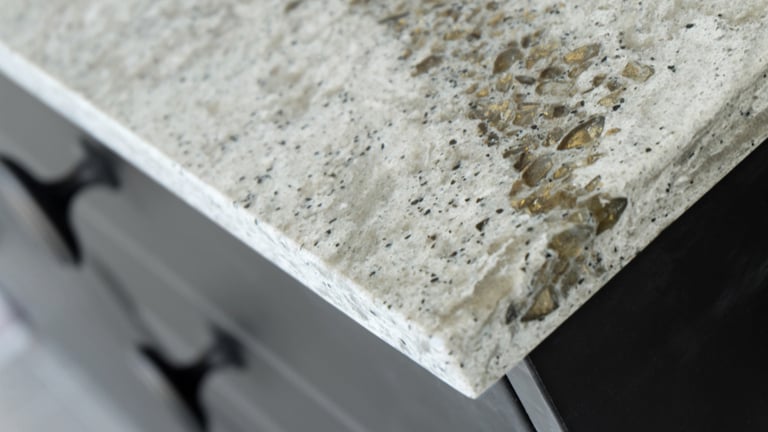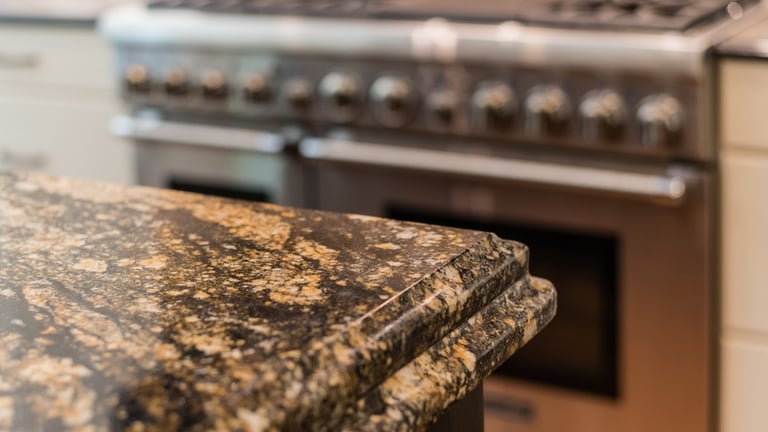Quartz vs. Granite Countertops: Which Is Best for Your Home?
Quartz and granite battle for the top spot of best countertop


Quartz and granite are similar in some ways, but their origins are very different.
Granite tends to look more natural because it is more natural.
Quartz gives you more design versatility and tends to be more environmentally friendly.
Granite is less expensive and less durable than quartz.
The time has finally come to renovate your kitchen or bathroom. First on the list, what material should you use for your countertops: quartz vs. granite countertops? Those are two of the most popular countertop material options, but it can be hard to determine which one is the right option for your home.
Granite has an authentic and naturally hewn look. Meanwhile, quartz is seen in kitchens all over the globe because it’s so resistant to staining—while chefs adore granite countertops for their ability to resist heat. Confused yet? Don’t worry; this guide will break down the difference between quartz and granite countertops to help you figure out which is the right stone material for your project.
What Is Quartz?
Let’s get scientific. Quartz is an igneous rock that is “fire-born.” That means it forms when melted rock cools and solidifies. Made of oxygen and silicon, it’s one of the most common minerals that come from Earth’s crust. Pure quartz tends to be clear while impurities will change its color. For example, amethyst, milky quartz, and smoky quartz all have purple, white, and black impurities, respectively.
Quartz is strong. It’s both physically and chemically resistant to wear and tear, making it a common choice for countertops. The countertops are created by finely grinding up natural quartz and combining it with resin. Manufacturers compact the combination into slabs and shape it before sealing and applying a finish to it.
What Is Granite?
Like quartz, granite is an igneous rock from the Earth’s surface. Homes used granite for around 80 years before quartz stepped on the scene. Not only is granite the most popular countertop material of the two options, but it’s the most common igneous rock. It’s composed of quartz and other minerals like feldspar, mica, and amphiboles. Its composition is responsible for the possible granite countertop colors, usually available in a red, pink, gray, or white color with dark, visible grains.
Granite is everywhere you look. It’s a favorite for countertops and a common go-to for floor tiles, curbing, and stair treads. The next time you look at the four presidents’ faces carved into Mount Rushmore, just remember that it's granite. The bigger the slab, the bigger the price tag. The process ends with polishing the slabs so they have an even thickness.
What’s the Difference Between Quartz and Granite?
The essential difference between granite and quartz is their origin. Granite is a stone formed in the ground (think of Snow White’s Seven Dwarves mining the day away). It comes out in big slabs, which are ultimately cut to fit your countertop.
With quartz, production isn’t that simple. It doesn’t occur naturally. Instead, it consists of a mixture of different types of rock that get set into a resin. Think of it this way: If granite is a three-tiered cake, quartz is the equally tasty cake pops made up from the crumbs and buttercream left over.
Key Differences: Quartz vs. Granite
| Quartz | Granite |
|---|---|
| Man-made mixture of rocks and resin | Naturally occurring stone |
| Requires almost no maintenance | Must seal annually |
| Numerous designs available | Limited color options |
| Prefabricated slabs | Each slab is one-of-a-kind |
| Indoor use only | Indoors or outdoors use |
| Heat-susceptible | Heat-resistant |
Quartz Pros and Cons

Here, we will be talking about engineered quartz, the mixture mentioned above.
Pros
Durable: Quartz countertops are difficult to chip, scratch, or damage, though you should still treat them with care.
Non-porous: Quartz countertops offer a non-porous surface, helping them repel germs and stains.
Color variety: Quartz comes in a wide range of colors, making it easy to match the style to your home.
Extended warranty: Some large manufacturers will offer upwards of 15 to 25 years of protection on quartz countertops because they are so durable.
Cons
Price: At $50 to $200 per square foot, quartz is generally pricier than granite, and many other countertop materials.
Installation: Quartz is extremely heavy, making installation difficult. You’ll want to hire a local countertop contractor because they’ll have the right equipment to measure, cut, lift, and install the quartz.
Heat-susceptible: Quartz is heat-resistant, but quartz countertops are not. When exposed to heat, the resin in the mixture will melt, leading to discoloration.
Only indoor use: When exposed to direct sunlight and UV rays, quartz countertops will change color, making them less than ideal for outdoor countertops.
Granite Pros and Cons

Pros
Heat-resistance: One of the biggest reasons to love a granite countertop is the ability to set down a hot casserole dish directly out of the oven. Granite is extremely heat-resistant, taking one worry off of your mind while cooking.
Natural appearance: If you’re looking for a beautiful, natural look, you can’t do much better than granite. Each design will be created by Mother Nature herself, offering you a unique piece for your home.
One-of-a-kind: Due to how manufacturers create granite countertops, there will never be a countertop that completely matches yours.
Resale value: Granite countertops are a sought-after home feature, so its inclusion may increase your home’s value.
Cons
Limited design choices: Granite’s natural appearance is a double-edged sword. Because it's naturally occurring, you don’t have quite as much control over what the slab looks like in your home.
Less durable: While you don’t have to worry about a hot pan, granite will generally be less durable than quartz. The good news is that it’s also easier to repair.
Maintenance: Granite countertops need to be sealed regularly—every 12 to 18 months—to prevent stains and bacteria from collecting.
Difficult repairs: Granite isn’t easy to damage, but when you do, it’s pricey to fix. Dullness, grease stains, and mild etching are easy to fix, but damages to the finishing are difficult or sometimes impossible to correct.
Quartz vs. Granite: How to Choose the Best for You
Both quartz and granite have great benefits when you put them to work as countertops in your kitchens or bathrooms, which explains why they have both been so popular for so long. But popular doesn’t always mean right for you, so let’s break it down by characteristics:
Appearance
It doesn’t get much more natural than a rock straight from the ground. Because granite occurs naturally and is mined in slabs, each piece plucked from the Earth is totally unique, with its own rich and distinctive variance in tones. “Natural” looking quartz countertops exist, but are never going to look as authentic and natural as granite.
Best natural-looking appearance: Granite
But don’t count quartz out yet! Because it is engineered by humans, you can dye it almost any color you desire and have any pattern you like applied to its surface.
Best design versatility: Quartz
Environmental Friendliness
While engineered quartz is not mined as one piece like granite, it’s the best choice for a green home design since the mining techniques used to extract it do less damage.
Most sustainable: Quartz
Affordability
If we’re going by the material itself, quartz countertop costs are more expensive, running at a rate of $50 to $200 per square foot. Remodeling with granite, on the other hand, goes at a rate of $15 to $140 per square foot.
More affordable: Granite
Installation
Outside of the cost of the countertops themselves, you will find that the cost of installing countertops ranges from $35 to $85 an hour for labor. In addition, because both granite and quartz countertops are large and made of stone, they are heavy and can be damaged if dropped. That makes countertop installation a project you want to leave to the experts.
Ease of installation: Tie
Maintenance and Durability
Quartz is engineered to last a long, long time. It’s easy to clean your quartz countertops and they can handle heat and moisture. It’s made with durability and scratch-resistance in mind. It’s not likely to chip or crack and can withstand most of the toughest obstacles that a kitchen or bathroom can throw its way. While granite is exceptionally strong, engineered quartz is factory-made, which means it has fewer natural flaws and cracks, making granite less durable. If you want to install a countertop and never have to worry about upkeep again, then you should consider quartz.
Most durable: Quartz
Repairs
While quartz is designed to never ever require fixing, repair can be more costly if it does break because it’s less common. Granite can chip easily, it’s also a lot easier to repair. If you need your quartz countertops repaired, expect to spend between $150 and $750. If your granite needs repair, expect to pay between $250 and $1,000.
Needs more frequent repairs: Granite
Jouviane Alexandre contributed to this article.














